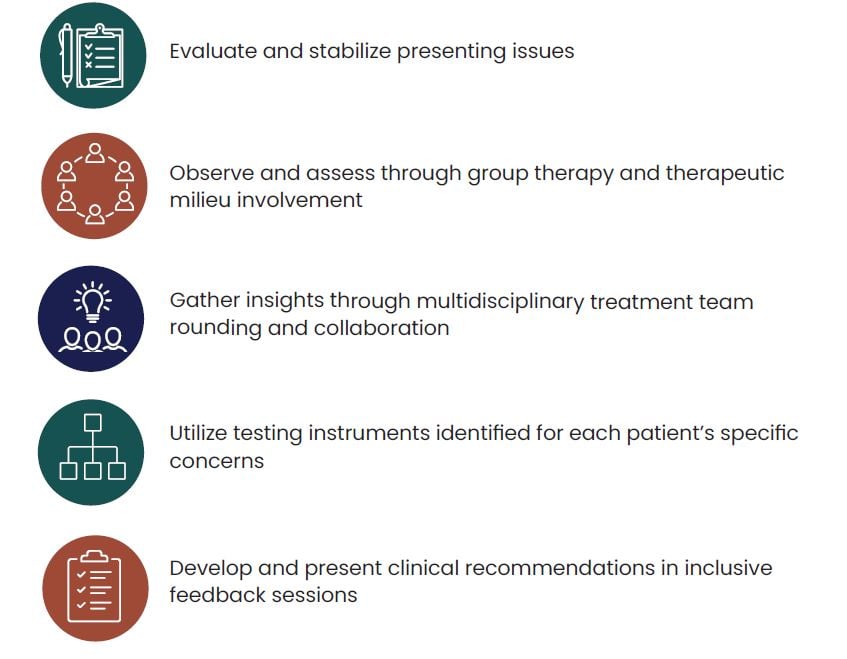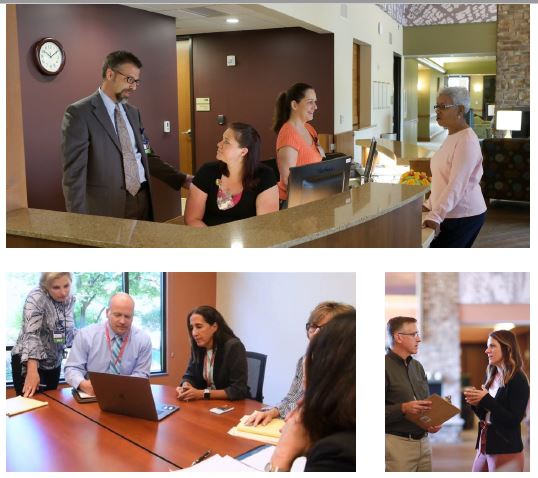Transforming Patient Care:
A Deeper and Wider Approach
Virtually all psychiatric disorders co-occur with other mental health conditions, medical issues or addictions. Patient populations now reflect complex comorbidity rather than diagnosis or co-occurring conditions. Put simply, patients consistently exhibit three or more significant challenges to their well-being. Lindner Center of Hope’s premier adult assessment and residential services acknowledge the importance of identifying complex comorbidity in order to improve patient outcomes. In fact, evaluation and assessment is vital in determining the next steps of treatment of complex comorbidity.
The Formula of Assessment and Treatment
Clarity is the Goal
Mental illness and addiction are, more often than not, complex. Every person and their life is unique. Comorbidities add to the complicated nature of mental illness and addiction. Clarifying or teasing out as many details as possible through evaluation and assessment can begin to make an accurate diagnosis and treatment recommendations attainable.
The Approach is Not One-Size Fits All
The unique presentation of mental illness and addiction in every individual, coupled with the level of severity of illness, makes a singular path for evaluation and assessment inadequate in the process of gathering and interpreting information that will ultimately result in answers to the question, “where do we go from here?”
Lindner Center of Hope addresses all phases of assessment.
Our residential offerings offer an individualized path to answers that patients, families and referral sources are seeking. Between our two adult units we can:
Lindner Center of Hope residential care may take shape in the following ways:
Late Teens (18 and 19 years old)
• Evaluation and/or assessment to help chart future path
• Early intervention, which improves outcomes
• Coping skills to assist with independence
• Family therapy to address failure to launch issues
• Future planning (college, work, etc)
• Problem solving the challenging start to college
• Education and treatment for emerging/existing substance use issues
Early Adulthood (20 to 35 years old)
• Evaluation and or assessment, including identifying emerging disorders
• Clarify future goals
• Enhancing motivation for recovery
• Values clarification
• Individual identity discovery
• Negotiating mental health issues in college and early career
• Negotiating parenting and mental health/addiction concerns
Mid-Life (35 to 50 years old)
• Evaluation and/or assessment for next steps direction
• Stress management
• Assisting high level professionals with self-care
• Coping with life transitions (i.e., health changes, launching children, divorce, etc)
Mature Adulthood (50 to 80 years old)
• RO DBT is an evidence based treatment that promotes increased flexibility and ease of coping and is often helpful to older adults.
• Evaluation and/or assessment to help plan what is next
• Adjusting to retirement or other life role changes
• Aging, chronic illness, loss of spouse
• Creating a network of support
• Transitioning of family business
• Coping with chronic pain
Late Adulthood (80+ years old)
• Evaluation and/or assessment for “what now”
• Coping with aging, failing health, dying
• Coping with chronic pain
A treatment team that prioritizes individual care.
The staff who conduct mental health assessment and treatment are the ones responsible for the outcomes and successes. The impressive team of mental health professionals at Lindner Center of Hope are full time, on-site and highly credentialed in a variety of subspecialties. This transforms the nature of clinical teamwork. MD’s and psychologists work side by side on a daily basis to share timely and critical patient information. This is the core of our DNA.
Lindner Center of Hope clinicians are at the top of their game, but often it is our heart-felt (Midwest) approach that makes the difference. This care is part of our DNA.
Subspecialties
- OCD/Anxiety
- Addictive Disorders
- Thought Disorders
- Eating Disorders
- Depression and Bipolar Disorders

